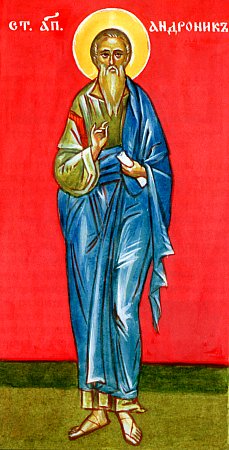
The Holy Disciples from the Seventy Silas
The Holy Disciples from the Seventy: Silas, Sylvanus (Siluanos), Crescentius, Epenetos and Andronikos
Commemorated on July 30
The Holy Disciples
from the Seventy: Silas, Sylvanus (Siluanos), Crescentius, Epenetos and
Andronikos – were disciples of the Saviour.
The Disciple from the
Seventy, Saint Silas, was a respected figure in the original Church at
Jerusalem, "of the chief men amongst the brethren" (Acts 15: 22). The
Council of the Apostles was convened at Jerusalem in the year 51 to deal with
the question, whether it be necessary for Christians converted from among the
Gentile-pagans to observe the (Old Testament) Mosaic Law [the Law-code
contained in the Pentateuch, or Torah, the first five books of the Old
Testament]. The Apostles afterwards sent a message with Paul and Barnabas to
the Antioch Christians, in which they reported by resolve of the Council,
Christians of Gentile-pagan origin were free from having to observe the prescripts
of the Mosaic Law. But it was prescribed for them, nonetheless, that they
refrain of partaking of foods offered to idols, from things strangled and from
blood, to refrain from fornication, and to do naught else than that which be
seemly (Acts 15: 20-29). Together with Saints Paul and Barnabas, the Council of
the Apostles sent along members of the Jerusalem Church, Saints Silas and Jude,
to explain the message in greater detail, since they both were filled with the
indwelling grace of the Holy Spirit. Saint Jude thereafter was sent back to
Jerusalem, but Saint Silas remained at Antioch and zealously assisted Saint
Paul, the Apostle to the Gentiles, on his missionary journeys preaching the
Gospel. They visited Syria, Cilicia, Macedonia.

The Holy Disciples from the Seventy Silas
In the city of
Philippi they were accused of inciting unrest among the people, and for this
they were arrested, thrashed with canes, and then thrown into prison. At
midnight, when the holy saints were at prayer, suddenly there occurred a strong
earthquake, their chains fell off from them and the doors of the prison opened.
The prison guard, supposing that the prisoners had fled, wanted to kill
himself, but was stopped by the Apostle Paul. Then, all atremble he fell down
at the feet of the saints, and with faith accepted their "euangelos"
("good-news") about Christ. He then led them out of the prison and
took them to his own home, where he washed their wounds, and was baptised
together with all his household.
From Philippi Saints
Paul and Silas proceeded on to the cities of Amphypolis, Apollonia and Soluneia
(Thessalonika). In each city they made new converts to Christ and built up the
Church.
At Corinth the holy
Disciple Silas was ordained bishop, and he there worked many a miracle and
sign, and there too he finished his life.
The Holy Disciple
Sylvanus (Siluanos) preached the Word of God together with the chief
Apostles Peter and Paul. In his First OEcumenical Epistle, the holy Apostle
Peter makes mention of him: "This in brief have I written to ye through
Sylvanus, your true brother, I do think..." (1 Pet. 5: 12). Saint Sylvanus
was made bishop at Soluneia (Thessalonika) and died there a martyr, having
undergone many a sorrow and misfortune for the Lord's sake.

The Holy Disciples from the Seventy Andronikos
About the Holy
Disciple Crescentius the holy Apostle Paul makes mention in his Second
Epistle to Timothy (2 Tim. 4: 10), saying that Crescentius had gone preaching
to Galatia. He was made bishop there, and afterwards he preached the Word of
God in Gaul (modern-day France). In the city of Vienna (modern-day Austria) the
holy Disciple Crescentius established his student Zacharius as bishop. Having
returned to Galatia, he died a martyr under the emperor Trajan (98-117).
The Holy Disciple
Epenetus was made bishop at Carthage. In his Epistle to the Romans, the holy
Apostle Paul writes: "Greet my dear Epenetus, who is from the beginnings
in Achaia [alt. Asia] for Christ" (Rom. 16: 5).
The Disciple
Andronicus is mentioned also in this same Epistle by the Apostle Paul:
"Greet Andronicus and Junia [June], my kinsfolk, famed amongst the
Apostles and even before me believing in Christ" (Rom. 16: 7). The holy
Disciple Andronicus was bishop in Pannonia (modern-day Hungary) (Comm. of
Saints Andronicus and Junia is 17 May).
© 1996-2001 by translator Fr. S. Janos.